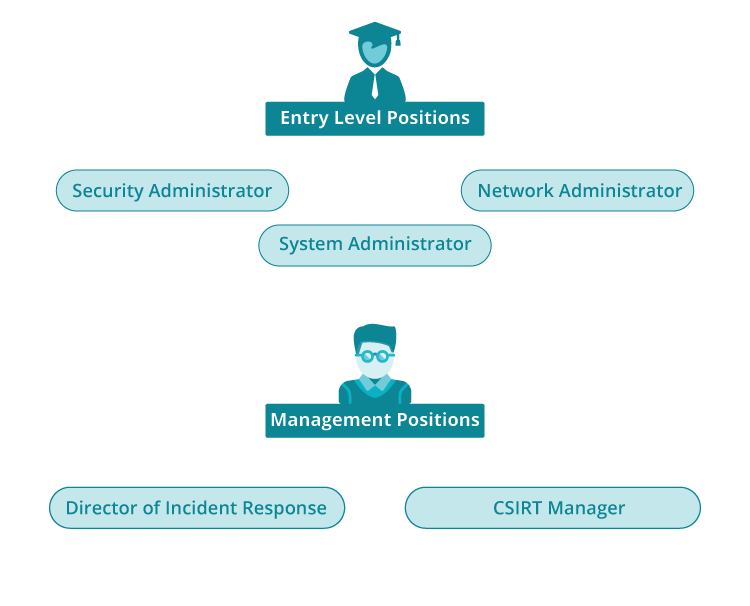HOW TO BECOME AN INCIDENT RESPONDER

In today's interconnected world, cyber security threats are becoming increasingly sophisticated and frequent. As a result, organizations are increasingly prioritizing cyber security and incident response professionals to mitigate the risks posed by cyber attacks. These professionals play a critical role in protecting an organization's assets and ensuring business continuity in the face of security incidents.
If you're interested in pursuing a career in information security and have a passion for problem-solving, then becoming an incident responder could be an excellent career path for you. In this guide, we'll cover the steps you need to take to become an incident responder, including the necessary skills and knowledge, practical experience, salary, certifications, and career paths.
WHAT IS INCIDENT RESPONSE IN CYBER SECURITY?
Incident response in cyber security refers to the process of responding to security incidents or cyber attacks that occur within an organization. The aim of incident response is to detect and analyze the attack, contain and eliminate the threat, and recover from the incident while minimizing damage and preventing similar incidents from happening in the future.
Incident response is a critical aspect of an organization's overall cyber security strategy as it ensures the organization is well-prepared to respond effectively to security incidents, protect its assets, and restore normal operations as quickly as possible.
WHAT DOES AN INCIDENT RESPONDER DO?
Incident Responders could be considered police officers or firefighters for an organization's network or system. You are trying to protect and prevent major threats and/or attacks from happening, and if needed apply changes so they do not occur again. The role of incident responders can be compartmentalized into the following five areas:
Detection and Identification of Cyber Incidents
They monitor and analyze network traffic, system logs, and other data sources to identify potential security incidents. They investigate alerts and suspicious activity to determine if an incident has occurred. And they subsequently document and report incidents to the incident response team and other relevant stakeholders such as the Chief Information Security Officer.
Cyber Incident Containment
Responders are responsible for isolating affected systems and networks to prevent the incident from spreading. For implementing temporary measures to mitigate the impact of the incident. And working with other teams, such as IT and security operations, to develop and implement a containment strategy.
Incident Investigation
They conduct thorough investigations to determine the cause and scope of the incident. They collect and analyze data, such as network traffic and system logs, to identify the attacker and their tactics. They perform forensic analysis to gather evidence that may be used in legal proceedings.
Incident Resolution and Recovery
Incident responders also develop and implement a plan to resolve the incident and restore normal operations. As well as test systems and networks to ensure that they are secure and free from malware or other malicious activity. Lastly, conduct a post-incident review to identify lessons learned and make recommendations for improvements to the incident response plan.
Collaboration and Communication
Naturally, they have to work collaboratively with other teams, such as legal, IT, and public relations, to ensure that the incident is contained and resolved effectively. They have to provide regular updates to stakeholders, such as senior management and customers, on the status of the incident and its impact on the organization. Finally, they participate in incident response training and exercises to improve collaboration and communication across teams.
CYBER INCIDENT RESPONSE SALARY
This is a unique job in cyber security due to the job demands. If an incident or emergency occurs, you may work longer hours for a couple of days and then have time off for the rest of the week. Your employer is going to need you to help avoid a crisis, but also be present during a crisis until it is resolved.
ANNUAL MEDIAN SALARY OF
$59,240
Incident Responder
ANNUAL MEDIAN SALARY OF
$169,510
Leadership & Management Positions
The median annual salary, per the U.S. Bureau of Labor Statistics Occupational Employment Statistics 2023, for a computer support specialist, a similar occupation to an incident responder, is $59,240. The top 10% in the field earned over $97,020.
WHAT IS REQUIRED TO BECOME A CYBER INCIDENT RESPONDER?

Education
This specific field in cyber security is not going to require you to hold a bachelor's degree. However, a technical degree in computer science or a similar field could widen your career options and boost your resume. There are specialized master's degrees available in Information Security or Information Assurance, which is what you should consider if a management position is something you aspire to reach.

Work Experience
For entry-level positions, the average is around three years of experience in incident response. Senior or team lead roles will most likely require at least five years of experience.

Hard Skills FOR INCIDENT RESPONDERS
- Familiar with forensics software such as EnCase, Helix, XRY and FTK
- Comfortable with archiving and backing up a variety of technologies
- Fluent in major programming languages such as Java, PHP, C++, C, C# and ASM
- Highly proficient in computer operating systems like Linux, UNIX and Windows
- Basic understanding of Internet-based application security

Soft Skills FOR INCIDENT RESPONDERS
- Quick thinking
- Confident in making decisions in high-pressure situations
- Willing to adapt to emergency situations
- Great problem-solving skills
- A logical and rational thinker
- Patient
- Well-spoken
- Good communicator
- Excellent writing skills

OBTAIN PROFESSIONAL CERTIFICATIONS
Companies will vary in their requirements for job certification in this field. It is always important to find out your company or agency's specified requirements before applying.
Some examples of certificates for cyber security roles an incident responder might be any of the following:
- Certified Reverse Engineering Analyst
- Certified Ethical Hacker
- Certified Computer Forensics Examiner
- Certified Penetration Tester
- GIAC Certified Intrusion Analyst
- GIAC Certified Incident Handler
- GIAC Certified Forensics Analyst
- Certified Computer Examiner
It is the perfect time to take advantage of this growing field of cyber security and start an exciting career as an incident responder. There are many advancement opportunities, along with the chance to become a hero for any number of major organizations and both the junior and senior levels.
CAREER PATHS AS AN INCIDENT RESPONDER

There are other cyber security jobs that can help you build some work experience to add or include on your resume in this area:
System Administrator
Network Administrator
If you are interested in moving up into a higher position in incident response, a possible career title to consider might be the Director of Incident Response or a CSIRT (Computer Security Incident Response Team) Manager.
INCIDENT RESPONSE JOBS & TITLES
The job title of an incident responder could go under the umbrella of cyber security career descriptions. Some of the following could be comparable titles:
Incident Response Engineer
Cyber Incident Responder
Computer Security Incident Response Team (CSIRT) Engineer
Computer Network Defense (CND) Incident Responder
KNOW THE DIFFERENCE: INCIDENT RESPONDER VS. FORENSIC EXPERT
Computer Forensics is a very close area to incident responding, and some businesses may actually require a background or experience in forensics. A Forensics Expert is a job that could be compared to an Incident Responder.
Incident Responder: The police officer in the digital world. Being proactive to help prevent any cyber attacks or breaches in the security system. First ones on the scene, incident responders are also there to help fix the emergency and take actions necessary to prevent it from happening again.
Cyber Forensics Analyst: A detective in the digital world. Trying to track down the cyber attackers and hackers. Use evidence and data from within the applications and networks and analyze to present findings to law enforcement or legal authorities.
GETTING STARTED
Finding the right program is the first step to launching your career path towards incident response in cyber security. Using the Find Schools widget on this page you can browse and get in touch with an array of vetted universities that offer cyber security related programs and degrees.
Explore Cyber Security Careers
- Becoming a Cryptographer
- Cyber Security Salaries Overview
- How to Become a Cryptanalyst
- How to Become a Cyber Security Analyst
- How to Become a Database Analyst
- How to Become a Forensics Expert
- How to Become a Network Security Analyst
- How to Become a Security Auditor
- How to Become a Security Consultant
- How to Become a Security Engineer
- How to Become a Security Software Developer
- How to Become a Security Specialist
- SOC Analyst Career Guide
